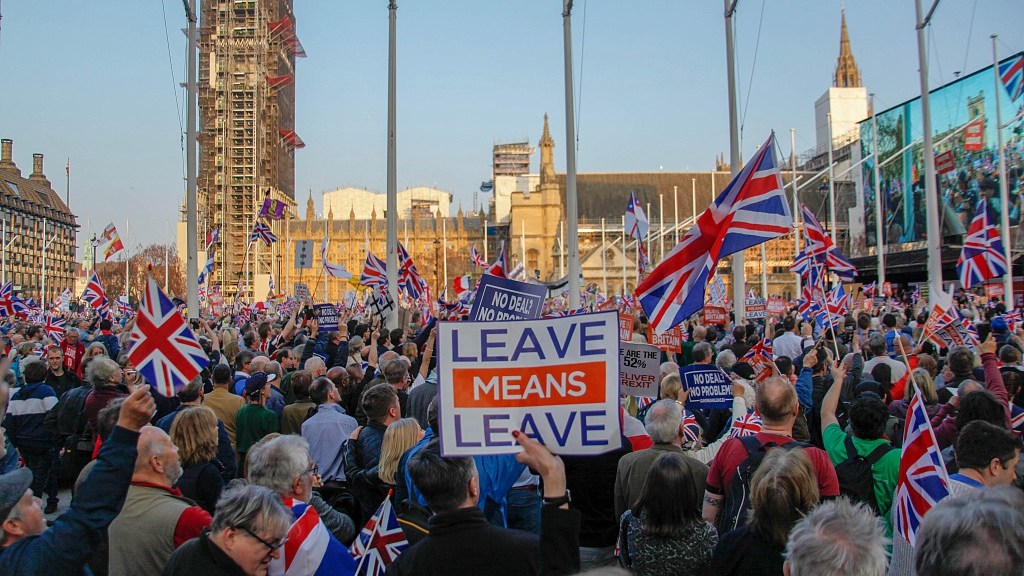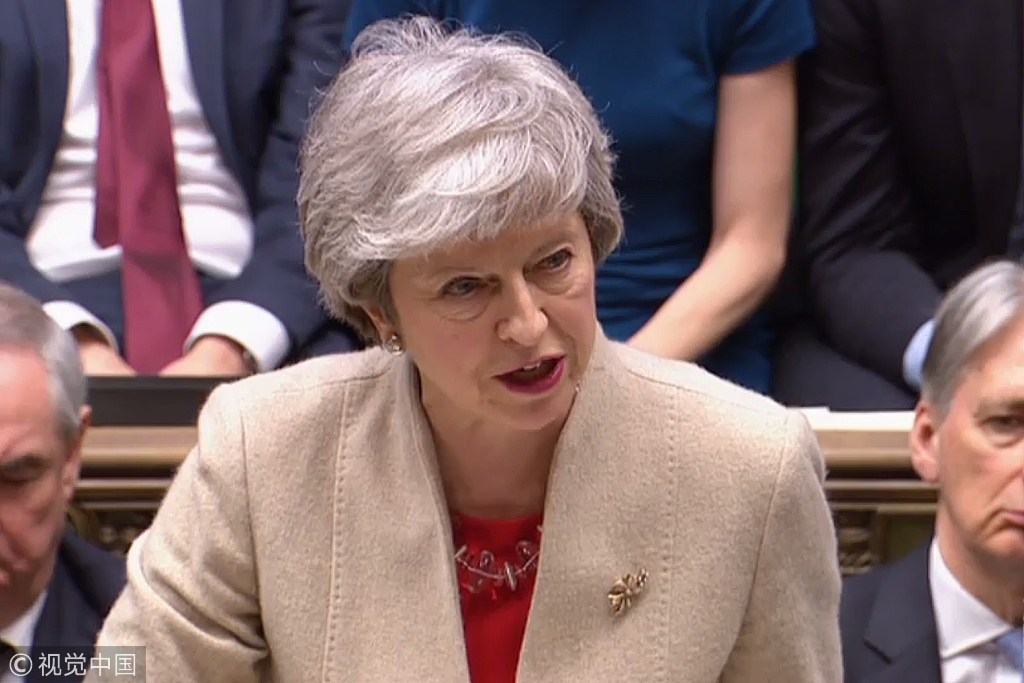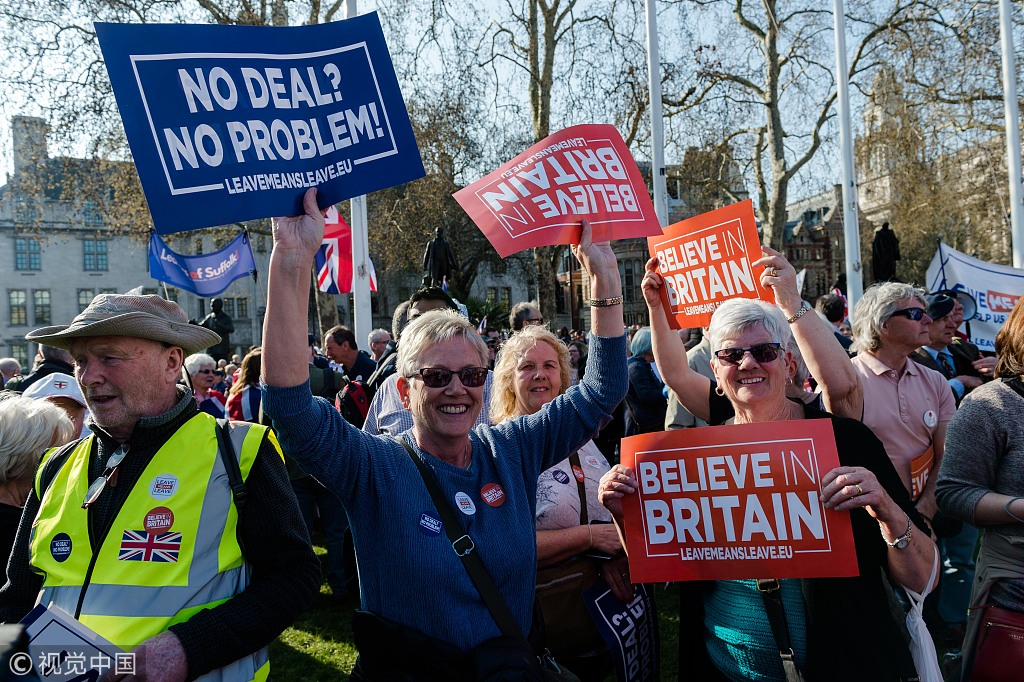
Opinion
17:44, 30-Mar-2019
It's time to think more seriously about a no-deal Brexit
Updated
19:18, 30-Mar-2019
Liu Mingli

Editor's note: Liu Mingli is deputy director of the Institute of European Studies, China Institutes of Contemporary International Relations. The article reflects the view of the author and not necessarily those of CGTN.
On March 29, UK Prime Minister Theresa May's Brexit deal was rejected by British MPs for the third time with a result of 286 to 344. According to the previous deal reached between May and the EU on March 21, the Brexit can only be delayed until April 12 instead of the scheduled May 22, since the deal failed to pass in the House of Commons. Hence, the future of Brexit is still chaotically uncertain.
The possibility of an orderly Brexit is diminishing since Theresa May could not get her deal approved even at the cost of stepping down. The UK may ask another extension after April 12. However, a short one would not help the parliament reach a consensus after it voted down all eight indicative options on Wednesday. A long extension will make the European Parliament elections, which will be held at the end of May, very complicated. With time running out, if this chaos continues, we may have to think more seriously about the scenario of a no-deal Brexit.
An EU-member for over four decades, the UK is deeply interconnected with the European continent in terms of economic activities as well as personnel exchanges. A sudden cut of those links may lead to chaos. For example, after a no-deal Brexit, there is likely to be a large backlog of goods at customs, waiting in line for passage. There may even be a short-time shortage of food and medicine.
Without a deal, WTO rules may apply to bilateral trade relations between the UK and the EU. The impact of tariffs could be significant for specific industries, such as the auto industry. According to The Society of Motor Manufacturers & Traders, about 30,000 components are needed to make a car in the UK, 60 percent of which are imported from abroad, mostly from the EU.

British Prime Minister Theresa May makes a statement in the House of Commons in London, UK, March 29, 2019. /VCG Photo
British Prime Minister Theresa May makes a statement in the House of Commons in London, UK, March 29, 2019. /VCG Photo
If the government were to impose a 10 percent tariff on these car components in the future, carmakers would be forced to pay much more. The reduced efficiency of customs clearance may also lead to the delayed arrival of industrial parts, affecting the production speed of enterprises.
For the service industry, the uncertainty coming out of a no-deal Brexit is even greater than for the trade of goods. In the UK, the service industry accounts for up to 80 percent of the national economy, while the WTO framework does not include the service trade in finance, aviation, lawyers, radio, and television and other important fields. That is to say, without an agreement to leave the EU, these areas would face an embarrassing "management vacuum" in bilateral relations.
How the UK, a top financial center, can continue to provide financial services to customers in continental Europe after Brexit is also a question of great concern. A couple of years ago, the European Central Bank's (ECB) plan to move certain euro clearing businesses from London to the eurozone fell through when Britain sued the ECB for breaching the principle of the "four freedoms of movement" in the European Court of Justice.

Pro-Brexit supporters gather on Parliament Square in central London for the "Leave means leave" rally in London, UK, March 29, 2019. /VCG Photo
Pro-Brexit supporters gather on Parliament Square in central London for the "Leave means leave" rally in London, UK, March 29, 2019. /VCG Photo
Once Britain leaves the EU, it loses the protection of EU law, and the migration of euro business is inevitable. Some financial institutions in the UK have also started to adjust their layout, shifting some business and personnel to other European financial centers such as Paris and Frankfurt.
A big headache may be the border between Ireland and Northern Ireland. A so-called hard border, which both Britain and the EU want to avoid, would have to emerge if customs were to be set up along the Northern Ireland border to keep the single market intact when Britain leaves. Regarding the possible resurgence of violence in the region, Britain and the EU may have to deploy security forces.
Due to the lack of sufficient preparation, once a no-deal Brexit occurs, the chaos it brings cannot be avoided in the short term. In November 2018, the Bank of England delivered a stark warning that a disorderly Brexit "would cause the GDP to shrink by 8 percent in a year, the pound to fall by 25 percent, inflation to soar to 6.5 percent and house prices to fall by 30 percent."
In the medium to long term, the lasting impact of a no-deal Brexit will depend on how the two sides manage the chaos after Brexit and what new bilateral agreements look like. In other words, a no-deal Brexit is not the end of the Brexit playbook, the two sides will continue to negotiate, and there will be a lot more uncertainties.
Currently, a no-deal Brexit is still one of the choices. British politicians are fighting to avoid this outcome, and the EU, despite its seeming indifference, would not be happy with a no-deal Brexit either. The Court's decision last year that the UK can revoke the Brexit unilaterally shows that the EU still intends to keep Britain in the EU.
Looking back at the course of European integration after World War II, it is not hard to see that there have been bitter quarrels between European countries, but last-minute agreements have been made at times because the burden of national and historical responsibility rests on politicians. As British Prime Minister Theresa May said recently, "History will judge us all." When it comes to the way of Brexit, only time will tell.
(If you want to contribute and have specific expertise, please contact us at opinions@cgtn.com.)

SITEMAP
Copyright © 2018 CGTN. Beijing ICP prepared NO.16065310-3
Copyright © 2018 CGTN. Beijing ICP prepared NO.16065310-3